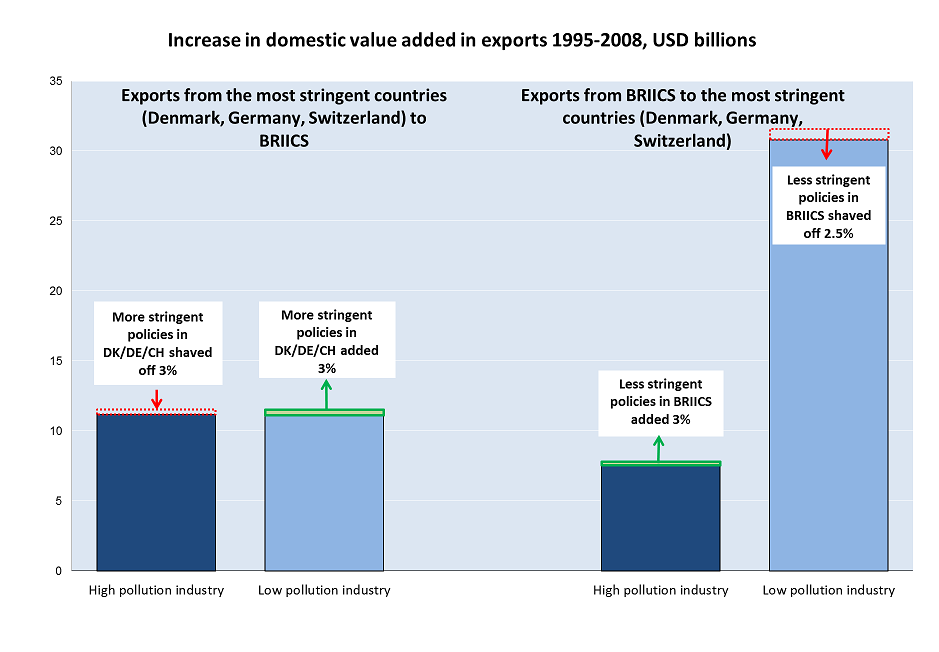Countries that implement stringent environmental policies do not lose export competitiveness when compared against countries with more moderate regulations, according to a new OECD study that examines trade in manufactured goods between advanced and emerging economies.
The findings suggest that emerging economies with strong manufacturing sectors like China could strengthen environmental laws without denting their overall share in export markets. High-pollution or energy-intensive industries like chemicals, plastics and steel making, whether in the BRIICS or in Europe or North America, would suffer a small disadvantage from a further tightening of regulations, but this would be compensated by growth in exports from less-polluting activities.
Do Environmental Policies Affect Global Value Chains? challenges the conventional wisdom that regulations to curb pollution and energy use hurt businesses by creating new costs. The so-called Pollution Haven Hypothesis suggests that tightening environmental laws often prompts manufacturers to simply relocate some production stages to countries with laxer regulations.
“Environmental policies are simply not the major driver of international trade patterns,” said OECD Chief Economist Catherine L. Mann, presenting the study at the London School of Economics. “We find no evidence that a large gap between the environmental policies of two given countries significantly affects their overall trade in manufactured goods. Governments should stop working on the assumption that tighter regulations will hurt their export share and focus on the edge they can get from innovation.”
Environmental policy has only a small impact on trade growth
 |
The new OECD study analyses historic export data in high and low pollution industries in 23 advanced countries and six emerging economies. It takes the domestic value added in export data and uses an OECD Environmental Policy Stringency indicator that ranks countries according to more or less stringent policies.
It shows that countries with stringent environmental laws suffer a very small disadvantage in pollution-intensive sectors such as steel-making, chemicals, plastics and fuel products. This is compensated by an edge gained in cleaner industries like machinery or electronics. Both effects are tiny compared to factors including market size, the lifting of trade tariffs, globalisation and a country’s intrinsic assets.
For example, domestic value added in exports of goods from high-pollution industries from the most environmentally stringent countries (Denmark, Germany and Switzerland) to the BRIICS rose by USD 11.157 billion from 1995 to 2008. That figure would have been 3% percent higher if green laws weren’t so stringent, yet the same stringent laws boosted exports in cleaner industries by 3% – almost the same amount in dollars.
Countries where manufacturers already pollute less should therefore gain global market share as tougher domestic laws are put in place. Industries and firms that become cleaner over time will prosper under more stringent policies, but those that fail to adapt will see their export performance erode.
As governments consider ways to tighten environmental regulations in line with new climate change pledges, this analysis offers evidence that doing so would not hurt trade. It bears out theoretical studies showing that factors like market conditions and workforce quality are likely to have much more impact on trade competitiveness. Tough environmental standards may also drive firms to become more innovative, improving both their economic and environmental performance.
The OECD Environmental Policy Stringency indicator is a composite index based on the explicit or implicit cost of environmental policies related mainly to climate and air pollution. It shows policies have become increasingly stringent in advanced economies since the 1990s, with the highest costs on polluting behaviour in Denmark, Germany, the Netherlands and Switzerland and the UK and US around average. Policies are more lenient in the BRIICS.
You can download Do Environmental Policies Affect Global Value Chains? here.
The brochure How stringent are environmental policies? can be found here.


